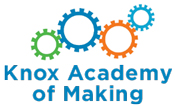By Hailey Parnell
When students come into Knox Academy, they are able to enjoy a higher level of autonomy and freedom than are typically found in a traditional school setting because we respect their agency as a person. Some may mistakenly think that because of this, we are against having boundaries. Actually, it is that respect for our boundaries that allows more freedom and autonomy to exist for the students. Because of this we also put a higher level of trust in our students and their ability to self regulate- something that most students need some time and guidance to learn how to do. We believe that by building this trust, students will learn to conduct themselves in an appropriate way because they choose to, and will take more responsibility for their actions than they would if they if they were being coerced or manipulated.
For this reason, it is imperative that parents work closely with their children on boundaries. We offer our students a lot of choice, especially as they grow older, but they are not free to impinge upon the freedom of others. If what they are doing becomes distracting and negative for others, or is really holding back their own progress, they need to step back and question those actions.
We ask that parents discuss and work with their children on things such as how to get the most out of your time here at school, and how to stay commi tted to group work and engagement with peers. We will also be talking with the kids about what is working and what is not at school and always looking for ways to improve. Our school uses a democratic process and each student should have a voice to share their thoughts and ideas. The students themselves are usually very quick to see when something isn’t working and collaborate to offer up a solution.
You may want to discuss with them things such as movement about the school, (especially for younger kids), use of cell phones and headphones, how productive your child feels they are being and what goals they have for themselves. (See our page on Self Directed learners.) We will set up guidelines for students for activities and use of their time and provide the needed resources to set up a rich learning environment. We will invite and entice them with plenty of engaging activities and also be mindful of needed down-time, outdoor time, friend time and breaks- which are so important for the creative process. We also realize that not every student will choose to get involved with every discussion or project as they explore personal interests, and that’s ok. We do allow freedom to move about the school and go to the restroom as needed. However, we do see that occasionally boundaries are pushed with things like cell phone and headphone use, leaving class activities a lot, and opting out of productive project time or the group cleaning time.
In these instances we will invite students to come back and re-engage; it’s hard for you and your group to get work done if you’re not there, it’s hard to engage with peers on a meaningful level if you are tuned out on a device, and it’s distracting to others when a student plays games/watches video on their phones and everyone stops to gather round and see what’s going on. It’s hard to keep a class activity going when students decide to leave and miss out on instructions and opportunities.
We ask that parents have discussions with their kids on how some of these things could keep them from getting the most out of their experience at Knox. Teach the use of boundaries in your own home and how they help keep the family running productively, while respecting others. If children experience the satisfaction of being productive with their responsibilities at home, and are held accountable for their choices, they will be ready to use their time productively at school. If they learn about relating and engaging in a meaningful way with you, they will be ready to communicate and problem solve with their peers. If parents, siblings, and friends are treated with patience and respect at home, children will be prepared to effectively work with their peers at school.
If you choose to send your child to school with a cell phone, ipod or other devices, know that we assume you have taught your child how to use this productively at school and trust that they are ready for that responsibility. It is a lot to ask the teachers to regulate all usage, so we urge you to talk about this with your child and decide together when they are ready for that responsibility.
We will always be there to help and guide kids to negotiate these boundaries. Everyone makes mistakes at times and these are great chances to grow and learn more about yourself. But because of the number of students and the basic philosophy of self-directed learning foundational to our process, we really depend on kids who can learn to self regulate and have respect for these boundaries. When students internalize this, they understand what an important role they have in our school. Most of the time we see that kids learn so much more effectively from their peers, inspiring and teaching each other. They will help others understand the need for boundaries so that everyone has an equal opportunity to reach their potential, have fun and keep this a safe, respectful learning environment. Our door is always open to communicate with you about how we can better meet the needs of your student in these areas. Thank you for working with your children to help them come focused and ready to contribute, learn and create!
